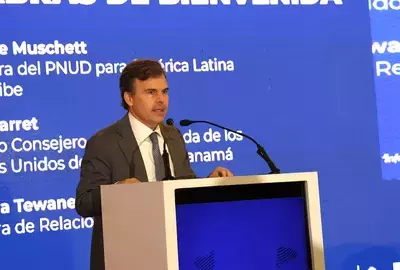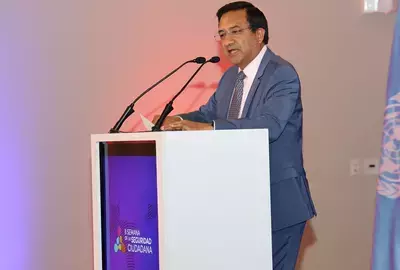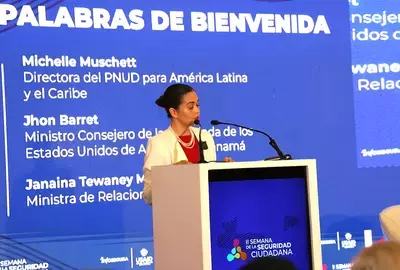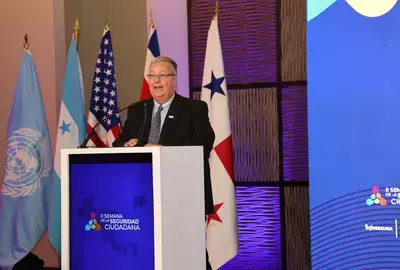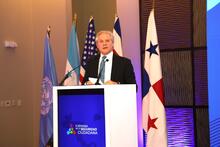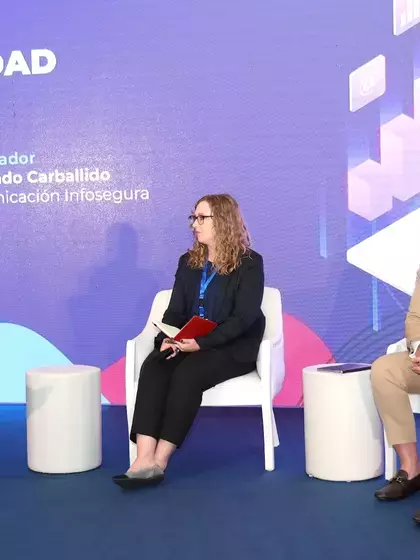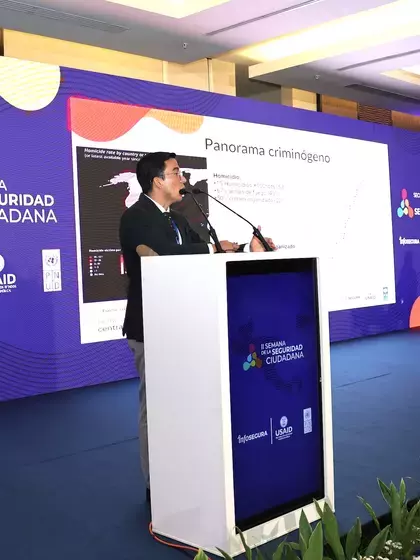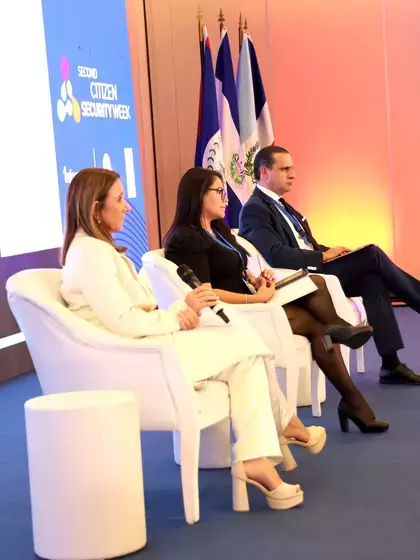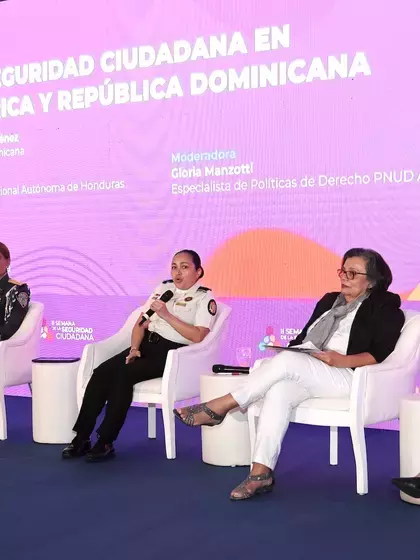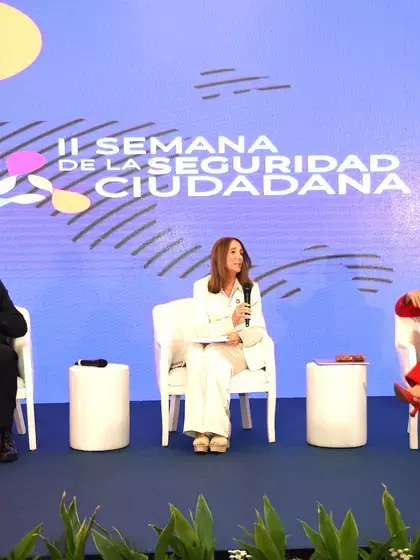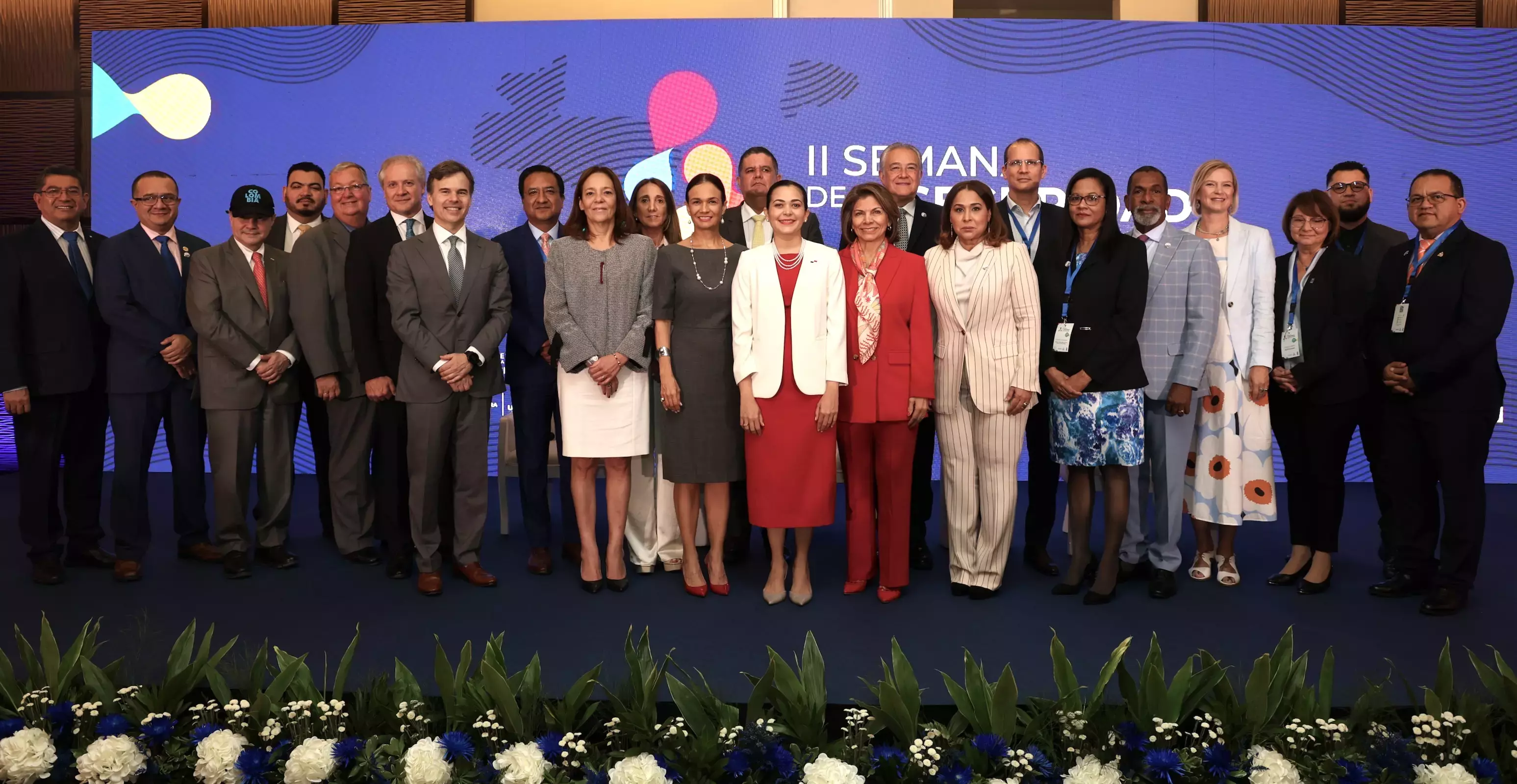
InfoSegura brings innovative people-centred solutions
The results exceeded expectations. The most significant citizen security event in the region has concluded with a sense of accomplishment in meeting the objectives outlined in the agenda. The event was highlighted by innovative people-centred solutions, engaging discussions among panellists and attendees, and the sharing of valuable lessons. The high level of active participation in all sessions was particularly noteworthy.
From 23 to 25 January, ministers, high-ranking Central American officials and from the Dominican Republic, international subject-matter experts, representatives from statistics institutions, the business sector and civil society organizations convened in Panama City.
The three-day event demonstrated the significant improvements in some of the security indicators in the region over the last decade, including a notable 44 per cent reduction in homicides since 2014. Although the numbers are encouraging, several participants noted the continuing evolution in crime dynamics and criminal phenomena. This underscores the need to multiply efforts to maintain and enhance security in the region.
The interventions by former President of Costa Rica Laura Chinchilla and former Vice President of Colombia Oscar Naranjo set the tone and standard for analysis, experiences and knowledge. Subsequently, the program consisted of alternating sessions that addressed a variety of citizen security-related issues. The sessions included forums, keynote lectures, presentations of projects, research and reports.
Michelle Muschett, Director at UNDP Latin America and the Caribbean, was responsible for the opening ceremony. She acknowledged the significance of exchanging experiences during the Second Citizen Security Week, stating: “This meeting is taking place at a critical juncture in the region, where organized crime and insecurity threaten democracy and development.” Although she recognized the region remains “the most violent in the world,” Director Muschett noted that InfoSegura data indicates the homicide rate has fallen sharply in recent years.
The UNDP director emphasized the fact that citizen security is “closely tied to a functioning democracy, opportunities for human development and equality.” In conclusion, she thanked the decision-makers from all across the region for their attendance at the event, for all the valuable insights they shared and for their commitment to bringing these insights back with them to their respective countries to inform laws and government initiatives.
Deputy Chief of Mission of the U.S. Embassy in Panama John Barett noted the historic support the United States has provided Central America and the Dominican Republic for addressing citizen security from a multidimensional perspective, with a view towards effective governance and inclusive development. “The InfoSegura Project has been providing data and statistics that are crucial for countries to design effective crime and violence prevention strategies and programmes,” he remarked.
Deputy Chief Barrett is of the opinion that the second component of the InfoSegura Project is of utmost importance. This component encompasses the digitalization of information and training for institutions and civil society organizations. “This initiative works to make data available in an accessible and understandable format, encouraging analysis to improve the quality of people's lives,” he said. He added that InfoSegura has made a significant contribution to strengthening ties among governments, academia, and civil society to address information gaps, challenges, and undertakings. This has been accomplished with a focus on the inclusion of a gender approach and the prevention of violence against children.
Janaina Tewaney, the Minister of Foreign Affairs for Panama, expressed her belief that citizen security is essential for strengthening democracy and the rule of law. In this sense, she shared her concern about the development of different forms of violence, which: “do not respect borders, and vulnerable groups are particularly affected.” Minister Tewaney emphasized the need for Citizen Security Week to become a permanent and coordinated platform, with a focus on human rights, redirecting strategies to preserve democracy and human dignity in the region.
The minister suggested that migration should be a personal choice, rather than a response to insecurity, and called for multilateral, cross-border efforts. The speaker concluded by emphasizing the significance of social inclusion in achieving a more equitable distribution of wealth, greater accessibility to scientific knowledge, and the reinforcement of citizen rights and responsibilities, all of which are necessary for the creation of safer, more just, and cohesive societies.
The subsequent participant, José Cruz-Osorio, Manager of the UNDP LAC Regional Hub, emphasized that the region must not sacrifice democracy or human development for security at any cost. The rule of law and solid institutions are the way forward to develop and fully expand people's capabilities and, therefore, to improve security.”
Cruz-Osorio delivered three fundamental messages. Citizen security is only achievable within a context of democracy and development, as he emphasized. Next, he discussed the intricacies of citizens' demands for security, punctuating that there are no “magical solutions” and that the focus must be “different in each country, requiring strong institutions, comprehensive policies based on accurate data and a multisectoral perspective rooted in human rights.” In his third message, he highlighted the importance of reinforcing a people-centred perspective in future strategic actions for citizen security.
Throughout his intervention, Cruz-Osorio insisted on the complexity of the social and political landscape the region is experiencing and the importance of addressing the challenges from a comprehensive approach placing people at the centre of citizen security policies.
The final speaker at the opening ceremony was Christopher Cushing, USAID Mission Director for El Salvador, Central America and Mexico. Mr. Cushing emphasized the relationship between a safe and stable environment and achieving the Sustainable Development Goals.
Director Cushing noted that promoting effective and responsible governance in the security sector, “is critical to advance towards safer, more democratic and prosperous societies.” He added that the support of the United States Agency for International Development in Central America and the Dominican Republic through the InfoSegura Project, “has provided accurate information on the challenges ahead.”
USAID has been promoting the use and analysis of disaggregated data on citizen security and justice for almost a decade, the regional USAID Director emphasized. He added that, “this commitment to innovation has enabled institutions in a number of countries, like Belize, Costa Rica, El Salvador, Guatemala, Honduras and the Dominican Republic to design and implement evidence-based policies with a gender approach.” He recollected the “Those no longer here” campaign in Costa Rica, which resulted from an analysis of feminicides committed in that country in 2020.
Director Cushing expressed his gratitude to the ministers and high-level officials from throughout the region for their participation in the Second Security Week. He deemed their presence as “of vital importance” for continued success in collaborative efforts.
Following the formal speeches, the thematic sessions, talks and keynote speeches commenced under the global theme: “Innovative People-Centred Solutions.” A diverse range of speakers were featured, from former President Laura Chinchilla of Costa Rica and former Vice President Oscar Naranjo of Colombia, to ministers and vice ministers from Belize, Costa Rica, Panama or the Dominican Republic. Senior officials involved in citizen security, UNDP staff from all over the region, international academics and experts, were in attendance as well.
The sessions were very well attended and generated dynamic in-depth conversations. The panellists, authorities, and the public gained valuable insights and lessons to implement effective strategies that will have a lasting impact on the security and well-being of the region. The event attendees agreed, with the support of UNDP and USAID through InfoSegura and with the renewed commitment of the participating countries, that data and innovation are the key to continue advancing towards safer, fairer and more cohesive societies.
Christopher Cushing, Mission Director to USAID in Central America and Mexico.

